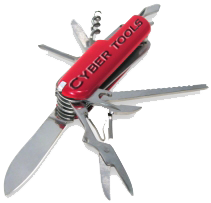Latest News
First 'All-hands' Meeting
On October 18th, the first All-hands Meeting for the NSF RII award took place in Baton Rouge. As members of the RII Advisory Board, Ron Hutchins, Jordan Konisky, and Vince McCoy were present. Two of the LONI Institute fellows attended the meeting as well. You can download presentations of Drs. Allen, Cortez, Gaver, Khonsari, and Seidel. Here are pictures and a few more details on the meeting. [Other News]
Description of Work Package 4
Without modification, traditional application software, run in a modern grid environment, will be blind to the advanced compute, data, network, and visualization services, found in the modern CI environment envisioned for LONI. We will address this issue by creating highly integrated, statewide science-CI teams to develop application toolkits and services for the specific S&E drivers of this proposal, while creating an advanced foundation for virtually every discipline across the State.
Cactus-based CFD and MD Toolkits.
All S&E projects in this proposal make use of CFD techniques and most use molecular dynamics (MD). Although codes exist for some applications in these areas, many are commercial or proprietary and virtually none make use of modern CI (i.e. make use of remote steering, coupling interfaces, grid services, multiple data structures, in an open, modular programming framework environment.) Building on the success of the Cactus-Einstein Toolkit, LSU-Tulane teams will work together to research and develop similar discipline-specific abstractions, creating advanced CFD and MD toolkits to support the S&E goals of this proposal, bringing together researchers across the State and creating new capabilities not currently available in any codes. The toolkits will be developed as an integral part of all S&E projects. For the MD toolkit, we will combine forces with the Illinois group to extend and adopt the object model of Charm++, which provides the underlying data structures for NAMD, chosen by NSF as a petascale benchmarking application, for use as an MD driver layer in Cactus.
The toolkits will enable Louisiana scientists to easily construct a new generation of advanced, highly scalable MD and CFD codes that can use structured, multiblock, adaptive, and unstructured parallel meshes, access data, compute, network, and visualization services, announce their status, and contact application managers to manage information about simulations or to couple dynamically with other running codes for DDDAS scenarios. Data streaming routines will be optimized for use in LONI for remote visualization, code coupling, migration, and archiving services. Independent jobs will discover one another through a LONI Application Information Management Service, and exchange data as they execute. Together, these tools will form the basis for a widely used and much stronger CI for these and many other Louisiana applications, helping the state to take advantage of future peta-scale NSF environments.
SAGA.
We will develop a set of Cactus thorns using SAGA libraries for operations needed by the S&E projects, including "Announce" services for advertising information about an application (to a portal or information server), and for data streams. These routines will also be developed as standalone libraries for use with any application. All applications will be able to use the Announce services developed to send complete metadata about simulations to the distributed data archives. SAGA adaptors will be developed for all LONI services, including most popular grid/HPC software (Globus, Condor, Stork, LSF, etc) and all higher level LONI services, such as GRMS, GPIR, and HARC. This adaptor development activity, and its use in applications, provides a natural integration process for the entire project: each WP and S&E project is involved. Adaptors will be fully tested and documented, and made available internationally through the SAGA community.
DDDAS and Decision Algorithms.
A new class of DDDAS algorithms will be developed and applied to storm-surge modeling and other application scenarios. These algorithms will be used to determine under which conditions certain models are launched and coupled, where they are executed, and which data streams are needed in storm-surge-wave modeling. Results depend dynamically on hurricane path and strength, water depth, terrain to be encountered, and resource availability. Error tracking and propagation algorithms will be developed to assess how errors propagate as models are coupled. We will also develop AI algorithms to aid both in the storm-surge forecasting, based on comparisons of historical databases and current conditions as an alternative to simulations, and for retinal science studies to aid in diagnosis and decision-making. Various potential classes of algorithms will be evaluated, including rule based reasoning, neural networks, case-based reasoning, Markov chains, and Bayesian networks.
All WP4 activities will be fully documented, so that the same generic tools can be used to advance other application communities, with the application specific tools providing "worked examples" to guide the development for other disciplines. Statewide training workshops will be carried out by LONI staff. By the third year of the project, WP4 will have advanced to the point that six additional research groups, empowered by the introduction of six new graduate students from LONI member institutions, will be engaged across the State, taking the well-developed services of the WP1-3, and application toolkits from WP4, and applying them in other disciplines. By the end of the project, we will create production-ready and demonstration-example applications in areas of reservoir simulations, storm-surge modeling, hurricane simulation, AI medical decision support, airplane design, biofluids, bioinformatics, astrophysics, digital music, and others.
[ Back to top ]
